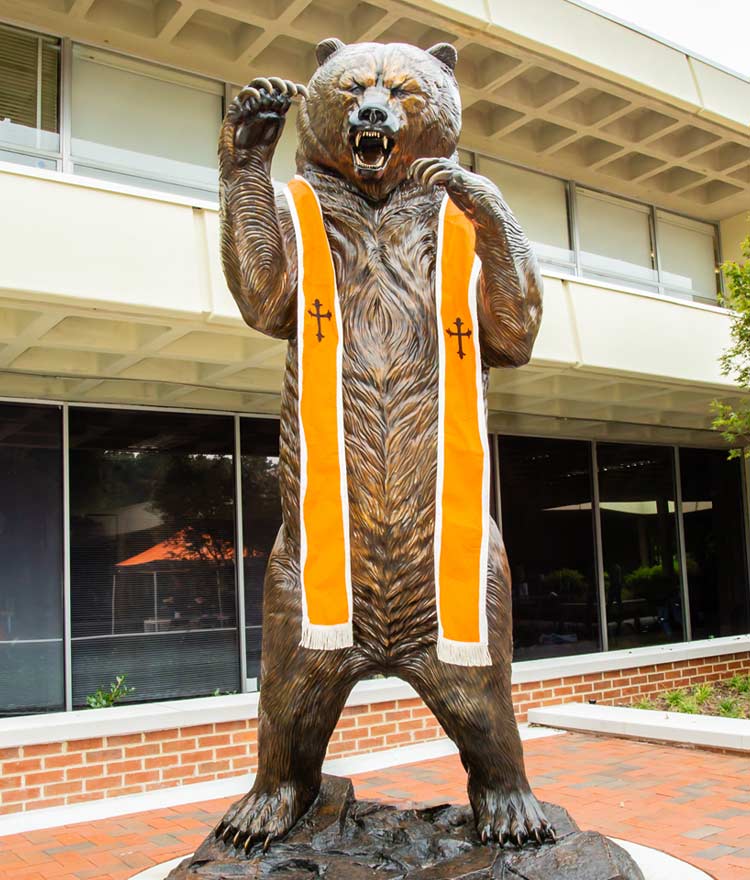Mission, Vision and Founding Principles
Imagine • Discover • Create

Vision Statement
Our vision is to inspire churches and communities to imagine, discover, and create God's loving and just world.

Mission Statement
Mercer University's School of Theology forms ministers and cultivates leaders who thrive spiritually, professionally, and academically in service with congregations, communities, and classrooms.
Diversity and Inclusion
Embrace of Diversity
We embrace human differences on the basis of race, color, sex, age, ethnicity, national origin, residential status, geographic status, urban-rural status, migrant status, veteran or military status, legal status, marital status, pregnancy status, sexual orientation, gender identity, cultural affiliation, political ideology, voter status, religious identity, medical condition, genetic information, physical health, mental and behavioral health, emotional state, and personal characteristics or circumstances.
Recognition of Identity
We recognize that no one is defined by a single identity, and that our multiple identities interact and intersect with one another to encompass a whole that is greater than the sum of its parts. We also recognize that each of us has the right to determine which identities are most important to us, and we therefore oppose any circumstances in which that right is denied.
Respect for Humanity
We respect the dignity and worth of humanity as it exists on all levels, including the genetic, personal, organizational, and global. Individuals exist within the various and intersecting contexts of self, family, community, and society, and only by acknowledging all of these can we have full respect for humanity.
Commitment to Growth
We embrace what we believe is a universal human endeavor to better understand our own humanity. We commit to continuously striving for greater understanding of the diversity of humanity, including the social, political, ethical, legal, and other challenges that arise as a result of our individual and societal failures to properly embrace this diversity. We oppose, and advocate for solutions to, all such obstacles, including oppression, subjugation, abuse, prejudice, bias, stereotyping, bullying, violence, and microaggressions. We recognize that all of these phenomena can occur at both individual and systemic levels. Finally, we advocate for their solutions; at the McAfee School of Theology, one of the primary solutions is through continual education and dialogue for faculty, staff, students, organizational partners, and community members.
*These Core Values were developed by The Diversity and Inclusion Committee of McAfee School of Theology at Mercer University.
The Ten Founding Principles of the McAfee School of Theology
Based on Jesse Mercer’s vision, the McAfee School of Theology is founded on ten principles that have guided its inception and will continue to guide its formation and character:
- The School shall be founded upon the belief that Jesus Christ is the Word of God, the center and focus of faith.
- The School shall spring from Mercer University’s conviction about its own vocation as an institution, borne and nurtured by Baptists and Baptist churches and committed to undergirding the work and witness of the church as a community of faith.
- The School shall seek to educate students who are:
- literate and disciplined in the study of sacred scripture;
- articulate in understanding the historical and theological issues of faith;
- effective preachers and interpreters of the Christian gospel;
- wise and compassionate in personal and social ministry;
- prepared to integrate faith and life in the spiritual formation of congregations.
- The School shall be devoted to the preparation of men and women who combine the call of God’s spirit with the intellectual gifts, the emotional maturity, and the spiritual discipline to become effective and responsible pastors and leaders in ministry.
- The School shall be inclusive in spirit and practice, affirming the open search for truth, and fostering tolerance for religious and intellectual diversity.
- By underscoring both scholarly discipline and the experience of ministry, the School shall seek to break through the dichotomy of theory and practice, claiming both reason and compassion, the mind and the heart as gifts of God and conceiving ministry as bringing the sacred to bear upon every dimension of human experience.
- The School shall hold steadfastly to the high and defining traditions of Baptists, including the priesthood of believers, the separation of church and state, the autonomy of the local congregations as the context for mission and ministry, the centrality of scripture to the life of faith, and the resolve that neither creeds nor human affirmations of faith should stand as tests of orthodoxy.
- While holding firmly to its high calling and to its specific responsibility for theological education among Baptists, the School shall also accept its responsibility to embrace the whole world as the creation of God and to serve the wider Christian community as the people of God who are called to live out God’s purpose and presence in the world.
- The School shall embody the historical traditions of Mercer University, valuing both intellectual freedom and the affirmation of faith as the foundations of the University.
- The School shall serve as a continuing resource to churches, pastors, and professionals in ministry for their continuing education and as a reference and placement service for churches, pastors, and other church leaders.